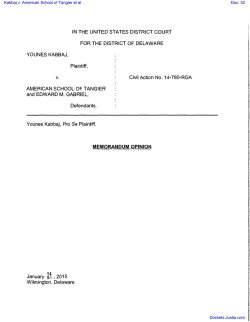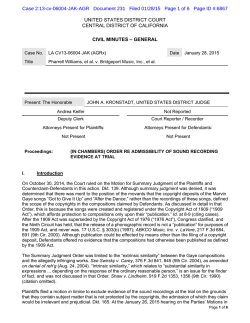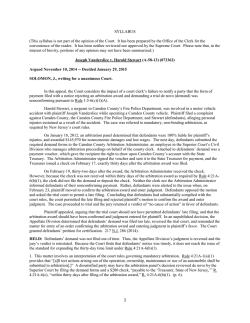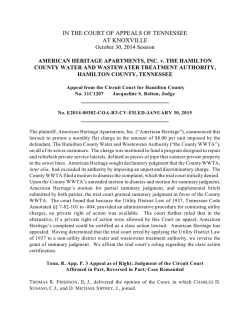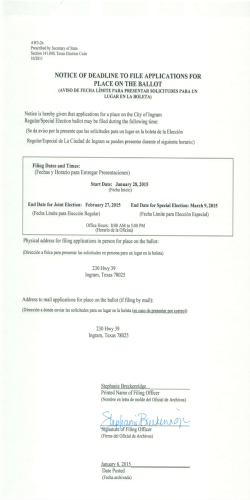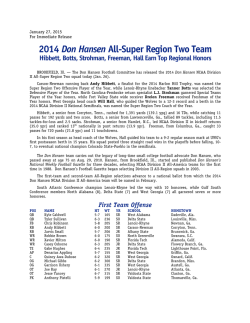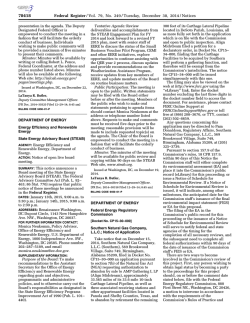
Samuel E. Foster, et al v. Walter William Chiles, III, M.D.
IN THE SUPREME COURT OF TENNESSEE AT KNOXVILLE September 4, 2014 Session SAMUEL E. FOSTER ET AL. v. WALTER WILLIAM CHILES, III, M.D. ET AL. Appeal by Permission from the Court of Appeals, Eastern Section Circuit Court for Knox County No. 122712 Dale C. Workman, Judge No. E2012-01780-SC-R11-CV – Filed January 27, 2015 This appeal presents two issues for review: 1) whether a person asserting a health care liability claim must give written notice of the claim to all potential health care defendants before re-filing a complaint, or whether notice given before filing the first complaint is sufficient notice for a subsequently filed complaint against the same defendants; and 2) if pre-suit notice is required for each complaint, whether the sanction for noncompliance is a dismissal with or without prejudice. The plaintiffs, before filing their health care liability complaint, gave the defendants written notice under Tenn. Code Ann. § 29-26-121(a)(1). Thereafter, the plaintiffs voluntarily dismissed their complaint. The plaintiffs re-filed their complaint but did not provide the defendants with notice before the re-filing. The trial court dismissed the complaint with prejudice for failure to comply with the notice requirement of Tenn. Code Ann. § 29-26-121(a)(1). The Court of Appeals reversed, holding that the plaintiffs had to give pre-suit notice only once and that pre-suit notice for the first complaint was sufficient for any subsequently filed complaints asserting the same claims against the same defendants. We hold that Tenn. Code Ann. § 29-26-121(a)(1) requires that plaintiffs notify prospective defendants of a forthcoming health care liability lawsuit before the filing of each complaint. The sanction for failure to comply with Tenn. Code Ann. § 29-26-121(a)(1) is a dismissal without prejudice. Tenn. R. App. P. 11 Appeal by Permission; Judgment of the Court of Appeals Reversed; Case Dismissed SHARON G. LEE, C.J., delivered the opinion of the Court, in which CORNELIA A. CLARK, JEFFREY S. BIVINS, and HOLLY KIRBY, JJ., joined. GARY R. WADE, J., filed a separate dissenting opinion. Stephen C. Daves, Knoxville, Tennessee, for the appellants, Walter William Chiles, III, M.D., and Knoxville Urology Clinic, P.C. Edward G. White, II, and B. Chase Kibler, Knoxville, Tennessee, for the appellants, Gordon Lee Collins, M.D., and Anesthesia Medical Alliance of East Tennessee, P.C. F. Michael Fitzpatrick and Rachel Park Hurt, Knoxville, Tennessee, for the appellants, Covenant Health and Parkwest Medical Center. John D. Agee and Bradley D. Williams, Clinton, Tennessee, for the appellees, Samuel E. Foster and Mary Foster. OPINION I. In November 2009, Samuel Foster received medical treatment from Dr. Walter William Chiles, III, Dr. Gordon Lee Collins, Knoxville Urology Clinic, Anesthesia Medical Alliance of East Tennessee, Covenant Health, and Parkwest Medical Center (“Defendants”). On November 18, 2010, pursuant to Tenn. Code Ann. § 29-26-121(a)(1), Mr. Foster, through counsel, notified Defendants of his intent to file a health care liability action against them. On March 17, 2011, Mr. Foster and his wife, Mary Foster, filed a health care liability complaint in Knox County Circuit Court against Defendants. On May 6, 2011, the Fosters voluntarily dismissed their case. On May 4, 2012, the Fosters filed a new complaint in Knox County Circuit Court, raising the same claims against the same defendants.1 The complaint alleged that the notice requirements of Tenn. Code Ann. § 29-26-121(a) had been met, as shown by an affidavit attached to the complaint. However, neither an affidavit nor any proof of service of notice was attached to the complaint. The Fosters did not give Defendants pre-suit notice after dismissing the first complaint and before filing the second action. Defendants moved to dismiss the complaint under Tenn. R. Civ. P. 12.02(6), based on the Fosters’ failure to comply with Tenn. Code Ann. § 29-26-121(a)(1). Defendants asserted that § 29-26-121(a)(1) requires pre-suit notice to be given each time a complaint 1 The second suit was filed pursuant to Tenn. Code Ann. § 28-1-105(a), which provides: If [an] action is commenced within the time limited by a . . . statute of limitation, but [a] judgment . . . is rendered against the plaintiff upon any ground not concluding the plaintiff’s right of action, . . . the plaintiff . . . may . . . commence a new action within one (1) year. . . . Tenn. Code Ann. § 28-1-105(a) (2012). -2- alleging health care liability is filed. Further, Defendants argued that the Fosters’ failure to comply with § 29-26-121(a)(1) warranted a dismissal with prejudice. In response, the Fosters argued that they complied with the notice statute because they provided Defendants pre-suit notice before filing the first complaint and that the original notice was sufficient for any subsequently filed complaints. The trial court granted Defendants’ motions to dismiss, finding that Tenn. Code Ann. § 29-26-121(a)(1) requires plaintiffs who have voluntarily non-suited a health care liability action to provide notice to all defendants before re-filing the action. The trial court dismissed the complaint with prejudice. The Court of Appeals reversed, holding that the Fosters had complied with Tenn. Code Ann. § 29-26-121(a)(1) by providing Defendants notice at least sixty days before filing their second complaint. The intermediate court reasoned that since the complaints were essentially identical, the plain language of § 29-26-121(a)(1) required only that Defendants be notified once. The Court of Appeals found that the Fosters’ failure to attach to their complaint proof of service of notice under § 29-26-121(b) did not require dismissal and would have allowed the Fosters to late-file the required documentation. We granted Defendants’ application for permission to appeal to decide whether a person asserting a health care liability claim must give written notice of the claim to all potential health care defendants before each complaint is filed, or whether notice given before filing the first complaint is sufficient notice for a subsequently filed complaint against the same defendants. Further, if pre-suit notice is required for each complaint, we must determine whether the sanction for noncompliance is a dismissal with or without prejudice. II. We review the trial court’s dismissal of the complaint in this case de novo with no presumption of correctness. Thurmond v. Mid-Cumberland Infectious Disease Consultants, PLC, 433 S.W.3d 512, 516 (Tenn. 2014) (citing Myers v. AMISUB (SFH), Inc., 382 S.W.3d 300, 307 (Tenn. 2012)). In analyzing the legal sufficiency of the complaint, we must presume that all factual allegations in the complaint are true and construe them in favor of the plaintiff. Lind v. Beaman Dodge, Inc., 356 S.W.3d 889, 894 (Tenn. 2011) (citing Stein v. Davidson Hotel Co., 945 S.W.2d 714, 716 (Tenn. 1997)). The issue of statutory construction involved in this appeal is also a question we review de novo, affording no presumption of correctness to the decisions of the lower courts. Womack v. Corr. Corp. of Am., No. M2012-00871-SC-R11-CV, 2014 WL 4670807, at *3 (Tenn. Sept. 22, 2014) (citing Baker v. State, 417 S.W.3d 428, 433 (Tenn. 2013)). -3- It is our duty to ascertain and fully effectuate the intent of the Legislature. Thurmond, 433 S.W.3d at 517 (citing Baker, 417 S.W.3d at 433). In doing so, we must take care not to broaden a statute beyond its intended scope or unduly restrict its coverage. Shore v. Maple Lane Farms, LLC, 411 S.W.3d 405, 420 (Tenn. 2013) (citing State v. Strode, 232 S.W.3d 1, 9 (Tenn. 2007)). We are to construe statutes reasonably, to “avoid[] statutory conflict and provide[] for harmonious operation of the laws.” Baker, 417 S.W.3d at 433 (quoting Frye v. Blue Ridge Neuroscience Ctr., P.C., 70 S.W.3d 710, 716 (Tenn. 2002)). Our construction of a statute must begin with the words the Legislature has chosen. Lee Med., Inc. v. Beecher, 312 S.W.3d 515, 526 (Tenn. 2010) (citing Waldschmidt v. Reassure Am. Life Ins. Co., 271 S.W.3d 173, 176 (Tenn. 2008)). We must presume that the General Assembly intended each word in a statute to have a specific purpose and meaning. Cunningham v. Williamson Cnty. Hosp. Dist., 405 S.W.3d 41, 44 (Tenn. 2013) (citing State v. Hawk, 170 S.W.3d 547, 551 (Tenn. 2005)). If the statutory language is clear and unambiguous, we apply its plain meaning, understood in its normal and accepted usage, without a forced interpretation. Baker, 417 S.W.3d at 433 (quoting Carter v. Bell, 279 S.W.3d 560, 564 (Tenn. 2009)). Where statutory language is ambiguous, we may decipher legislative intent in other ways, including consideration of the broader statutory scheme, legislative history, and other sources. Thurmond, 433 S.W.3d at 517 (citing Mills v. Fulmarque, Inc., 360 S.W.3d 362, 368 (Tenn. 2012)). III. A. Tenn. Code Ann. § 29-26-121(a)(1) provides for pre-suit notice as follows: Any person, or that person’s authorized agent, asserting a potential claim for health care liability shall give written notice of the potential claim to each health care provider that will be a named defendant at least sixty (60) days before the filing of a complaint based upon health care liability in any court of this state. Tenn. Code Ann. § 29-26-121(a)(1) (2012). In Myers v. AMISUB (SFH), Inc., we held, based on the clear language of Tenn. Code Ann. § 29-26-121(a)(1), that the requirement of pre-suit notice is mandatory and not directory. 382 S.W.3d at 308-09. Strict compliance with the pre-suit notice provision is required; substantial compliance is not sufficient. Id. at 310. Myers involved a -4- plaintiff who filed a health care liability action before Tenn. Code Ann. § 29-26-121(a)(1) became effective, non-suited the action, and then re-filed after the statute was in effect. Id. at 304. Before filing his second action, the plaintiff did not provide pre-suit notice to the health care defendants.2 Id. at 306. We held that the plaintiff was required to strictly comply with the statute and provide written pre-suit notice. Id. at 310. We noted that after the dismissal of the first suit, the filing of the second suit was the institution of a new and independent action, which required its own pre-suit notice to the defendants. Id. at 309. We address a somewhat similar issue in this case—whether notice given before the filing of the first complaint is sufficient pre-suit notice for a suit that is re-filed after the dismissal of the first complaint. The Fosters argue that § 29-26-121(a)(1) requires that pre-suit notice be given at least sixty days before the filing of “a complaint.” According to the Fosters, they gave Defendants pre-suit notice in November 2010, which sufficed for the complaints filed in March 2011 and in May 2012. Conversely, Defendants argue that the pre-suit notice given for the first complaint was not sufficient notice for the re-filed complaint and that they were entitled to new notice before the Fosters re-filed their lawsuit. The language of § 29-26-121(a)(1) provides that any person asserting a potential health care liability claim “shall” give written notice of the claim to each health care defendant at least sixty days before the filing of a complaint. By the use of the word “shall,” the Legislature evidenced its intent to require plaintiffs to give health care defendants notice of any complaint before it is filed. In Myers, we referenced the comments of Senator Mark Norris, the co-sponsor of Tenn. Code Ann. §§ 29-26-121 and -122, indicating that the new laws were “designed to give people notice that there’s about to be a claim and to put everyone who might be involved on notice that a suit will shortly be filed.” Myers, 382 S.W.3d at 309-10 (emphasis added). The notice statute, § 29-26-121, ensures that health care defendants are provided with timely notice of potential claims prior to the commencement of litigation. Stevens ex rel. Stevens v. Hickman Cmty. Health Care Servs., Inc., 418 S.W.3d 547, 564 (Tenn. 2013) (citing Myers, 382 S.W.3d at 309). Pre-suit notice affords defendants the opportunity to investigate the merits of a claim and to pursue settlement negotiations before suit is filed. Id. (citing DePue v. Schroeder, No. E2010-00504-COA-R9-CV, 2011 WL 538865, at *5-7 (Tenn. Ct. App. Feb. 15, 2011)); see also Jenkins v. Marvel, 683 F. Supp. 2d 626, 638-39 (E.D. Tenn. 2010) (noting § 29-26-121’s similarity with a 2 The plaintiff in Myers also failed to comply with Tenn. Code Ann. § 29-26-122 by his failure to attach a certificate of good faith to the complaint. See Tenn. Code Ann. § 29-26-122 (2012). -5- Texas pre-suit notice statute, also created “to facilitate early resolution of cases through settlement”). Early resolution of claims is beneficial to the parties and is an efficient use of judicial resources. When the Fosters first gave pre-suit notice on November 18, 2010, Defendants, knowing that a lawsuit was forthcoming, had the opportunity to investigate the claim and pursue settlement negotiations as contemplated by the notice statute. Suit was filed on March 17, 2011, but dismissed on May 6, 2011. As of the dismissal of the suit, there was no pending litigation between the parties. Eighteen months after the Fosters first gave Defendants notice of the original suit, and nearly a year after the suit’s dismissal, the Fosters sued Defendants again. The second filing was the institution of a new and independent action. Myers, 382 S.W.3d at 309.3 Defendants had no advance notice of the second suit, no chance to investigate the claim, and no opportunity to pursue settlement negotiations before the suit was filed. This was not the result intended by the Legislature in enacting § 29-26-121(a)(1). Although the March 2011 and May 2012 complaints asserted the same claims and involved the same parties, Defendants were statutorily entitled to separate notice of each forthcoming complaint so that they might evaluate the merits of the claim and pursue settlement. To hold otherwise would be to ignore the clear and unambiguous language of § 29-26-121(a)(1) and to thwart the intent of the Legislature. We do not favor procedural dismissals, but we are unwilling to engage in a strained interpretation of the statute to reach a desired result. The Fosters could easily have avoided the delay caused by the dismissal of their complaint had they simply complied with the statute and given Defendants pre-suit notice. We hold that Tenn. Code Ann. § 29-26-121(a)(1) requires that plaintiffs provide pre-suit notice to prospective health care defendants each time a complaint is filed. Because the Fosters did not provide Defendants with notice that they intended to recommence their health care liability action, the Fosters failed to comply with § 29-26-121(a)(1). B. We now address the consequences of the Fosters’ failure to comply with Tenn. Code Ann. § 29-26-121(a)(1). § 29-26-121 does not provide for a penalty or consequence for failing to provide pre-suit notice. We held in Stevens that 3 In Myers, the health care defendants had knowledge of the claim from the first-filed complaint, but we held that the defendants were still entitled to statutory pre-suit notice of the subsequent complaint. 382 S.W.3d at 309. The same is true in the case before us. -6- noncompliance with Tenn. Code Ann. § 29-26-121(a)(2)(E) required a dismissal without prejudice. 418 S.W.3d at 560. In Stevens, we noted that § 29-26-121 did not provide for a penalty for noncompliance, whereas § 29-26-122 expressly required a dismissal with prejudice for a plaintiff’s failure to file a certificate of good faith. Id. at 560-61. These code sections, §§ 29-26-121 and -122, were enacted together as part of the Tennessee Health Care Liability Act; therefore, we interpret these sections together and must presume that the Legislature intended for them to carry different sanctions for noncompliance. Id. at 560. The Legislature could have, but did not, provide for dismissal with prejudice for noncompliance with § 29-26-121(a)(1). Therefore, we hold that dismissal without prejudice is the proper sanction for noncompliance with Tenn. Code Ann. § 29-26-121(a)(1).4 Conclusion We hold that the Fosters were required to provide Defendants with notice under Tenn. Code Ann. § 29-26-121(a)(1) before filing their second complaint. The Fosters failed to provide the required pre-suit notice. We reverse the judgment of the Court of Appeals and dismiss this action without prejudice. Costs of this appeal are assessed to Samuel E. Foster and Mary Foster and their surety, for which execution may issue if necessary. _________________________________ SHARON G. LEE, CHIEF JUSTICE 4 As Tenn. Code Ann. § 29-26-121(a)(1) requires dismissal of this action, we need not address the Fosters’ noncompliance with § 29-26-121(b). -7-
© Copyright 2026
